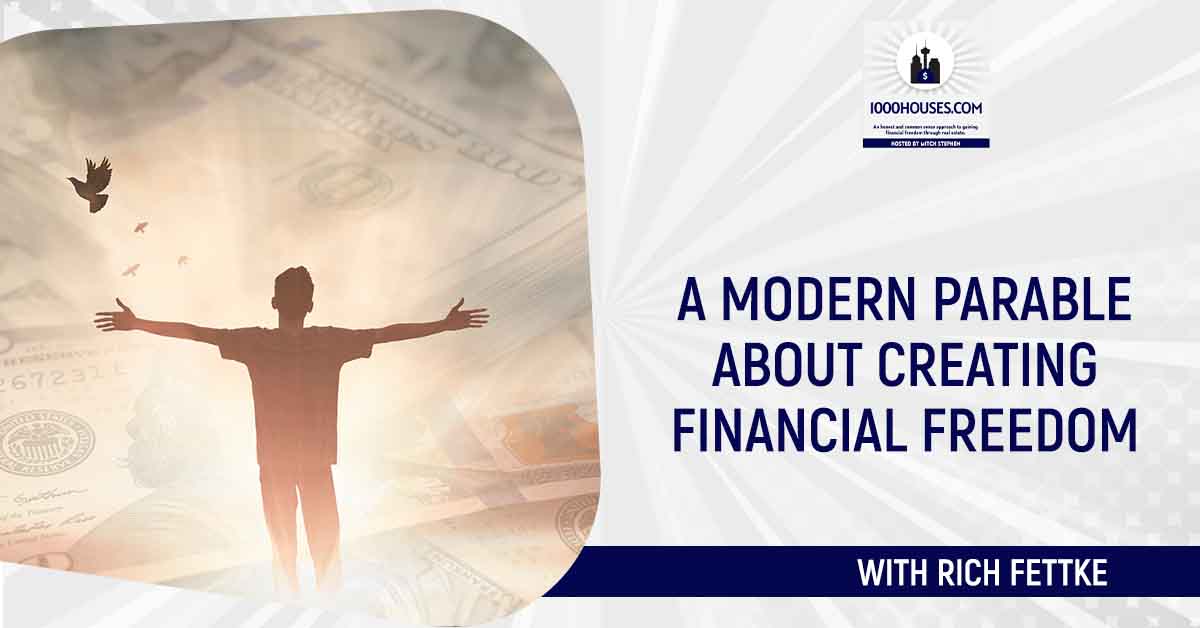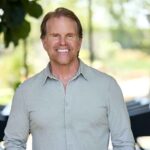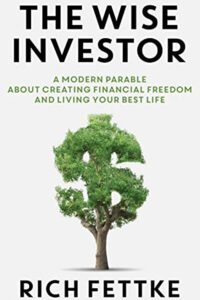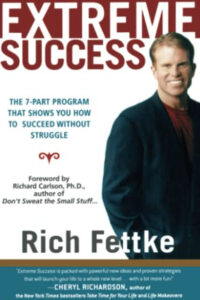PODCAST
A Modern Parable About Creating Financial Freedom By Rich Fettke


Mitch Stephen chats with
Rich Fettke
Episode 552: A Modern Parable About Creating Financial Freedom By Rich Fettke

The most common misconception about wealth is when someone owns expensive things, so we view them as wealthy. That is not always the case. In this episode, financial freedom is defined as exceeding our wants and needs, not by passive income but by positive cash flow. Rich Fettke, who founded RealWealth with his wife, shares his wisdom in creating financial freedom. Rich teaches us that it’s when you are in a state where you can do what you want with the people you want to be with, on your terms, that’s when you’re wealthy. Tune in to this episode as Rich paves the path to becoming wealthy through creating financial freedom.
—
Watch the episode here
A Modern Parable About Creating Financial Freedom By Rich Fettke
I’m here with Rich Fettke. This guy has a long list of accomplishments. He has been a real estate broker. He’s a real estate investor. He’s the Founder of RealWealth.com, which is an investment group that helps over 60,000 members focus on things like improving their financial intelligence, securing passive income, and obtaining financial freedom.
He’s out there helping people in the world try to find their financial independence, which is a topic near and dear to my heart as well. He’s also the author of Extreme Success which was put out by Simon & Schuster. In this episode, we’ll be talking a lot about the new book that he’s promoting. It’s called The Wise Investor. I like it already because it takes a lot to get wise in this business, a lot of scars and a lot of bruises. Usually, we try to learn from other people’s mistakes. Some of us have to learn by touching the burner with both hands. What inspired the book The Wise Investor?
There are so many amazing financial books and real estate books and all these nonfiction books. The first book that I wrote twenty years ago was non-fiction. I read this statistic that 86% of people do not finish a non-fiction book. I was like, “I don’t want to write a book like that if someone doesn’t finish and doesn’t want to read the whole thing.” I created a story. It’s a fictional story. It’s a parable but based on real-world events and real-world people that I’ve encountered running our company for the last nineteen years and see who the wise investors are, who the not-so-wise investors are, and the lessons I learned myself as an investor.
I wanted to weave it into a story because I feel like a story takes the information with an emotional eye. It creates this captivating read that you want to keep turning the pages. It communicates the lessons and the ideas in a way that sticks in a different way than just reading it as a typical nonfiction book. That’s why I wrote The Wise Investor in a parable format.
A lot of us read that book Rich Dad Poor Dad. I think he did that to us too. Kiyosaki made a parable. I don’t remember if that was fiction or non-fiction. It’s like this writing is a lot of truth plus invention. The truth sometimes is not fun enough. We have to embellish it a little bit to make it fun. As long as the spirit of the resolution is the same or true, then it’s good.
It’s like those movies based on a true story.
I wrote a book called My Life & 1,000 Houses: Failing Forward to Financial Freedom, which was not a planned book. I had a tragedy happen and I was journaling, which I never had done before in my life. It turned out to be 1,200 pages. What I was basically talking about was this is what happens after the get-rich seminar. This is the thing they didn’t tell you.
This is what happens when you go out there and meet some people that aren’t as nice as you. You’re going to meet them but they didn’t tell you about them. They’re out there and you’re going to find them. I wonder how the average person finds their way to financial freedom. I wonder if there are any core revelations that they all hit. Have you studied any of that?
A lot. That’s what we’ve seen running our business since 2003, and now it’s 65,000 members that we have at Real Wealth. I get to interview these people and find out where they were, what they did, and where they are now. There are some clues. That’s what I’ve woven into the story. It tells the story of this guy named Ryan Brooks. He’s a hardworking family man. He has a good six-figure income. He’s maxing out his 401(k) but he’s working so many hours that he has no time for his family, his wife, his kids or even to live.
He meets this wise mentor who is a real estate investor and he starts to show him how wealthy people operate. He teaches him about assets versus liabilities in a different way. Robert Kiyosaki wrote the foreword for The Wise Investor, which I’m very grateful for. I was stoked about that because Wise Investor is like a blend of Rich Dad Poor Dad, The Alchemist, and The Richest Man in Babylon. If you combined all those books into one, it’s like that. It has that timeless story but it’s a modern parable, so it happens in today’s time instead of in the past.
Some of the lessons that the mentor teaches are financial freedom. One of them is the mindset, how we think about money, and how wealthy people think instead of being envious like so many poor people do. They operate from a place of envy. They look at people with money as bad or evil or they’re jealous. That’s one of the principles. We have to change our mindset. That’s what I’ve seen.
Start to look at people with money and people who are wealthy as inspiration. It’s like, “I can do that same thing. If they learned it and they did it, I can do the same thing.” It’s like what you did with your thousand houses plus. It’s breaking it down. What you’re doing on a daily, weekly and monthly basis is what’s going to get you to financial freedom. Not the big get-rich-quick seminar or anything like that. That’s huge.
What are the common denominators of people as they’re on their way to financial freedom? What are some of the big revelations they have?
One of the big revelations is how they spend their money. It’s a huge one. That’s what the mentor starts with. He’s like, “I want you to write down all of your monthly expenses and come back to me in two weeks. Let me know what is your budget like and where all your money is going.”
Most people, when they do that, they don’t know where their money is going. I didn’t know either. I knew I had an apartment. I knew I had a car and car insurance. I knew a few bills. I knew I had a utility bill coming then it was about so much. It doesn’t take long before I run out of the knowns and then there’s this big old batch of money still left to be accounted for that I don’t know where it went. I did the same thing. I put everything on it on a credit card. If it was a $1.50 taco, I put it on a credit card so I could try to go back and figure out where it was going. It’s amazing how we don’t know.
I had a revelation about financial freedom when I heard the definition. Financial freedom happens when your wants and needs are exceeded by your passive income. I don’t believe in the word passive because I think it’s a misnomer. I changed it to cashflow. Financial freedom happens when your wants and your needs are exceeded by your positive cashflow.
The thing that it said to me, first of all, it was a good revelation because I thought financial freedom was something that rich people talked about. You had to be rich to be talking about financial freedom. It’s not the case because when I figured out my budget, the first revelation was I could pinpoint my financial point on a graph. I could draw my expenses and I could figure out my wants and needs.
I would know where that point was. The other thing was you didn’t have to be rich to be financially free because I only needed $3,500 a month to be financially free. As far as not having a job, I could replace my job. People take those words financial freedom and they put them in some lofty place, don’t they?
Poor people spend most of their focus on entertainment. Wealthy people spend most of their focus on education. Share on XThey think about the jets and the mansions and all that stuff. Before I started to invest in real estate, which was many years ago, I had the same belief. I was in a personal development workshop and they had us write our obituaries or our eulogies. In that, I wrote, “Rich Fettke dies at 108 years old. He was a successful real estate investor.” This is before I owned any property. I had that belief that someday I would invest when I had enough money, when I was wealthy or when I was rich. It was that mindset. It wasn’t until it becomes desperation for my wife and me in the beginning that we started to invest and found a way to invest without having a lot of money. We didn’t have to have a couple hundred thousand dollars to invest in real estate, which is the belief of a lot of people.
I had another revelation. People have to finally come to the conclusion that it does not take money to make money. It takes an action. There are plenty of strategies out there to deal with the problem of, “I don’t have any money.” They have strategies exactly for that.
A hundred percent. That’s what the mentor guides Ryan Brooks on in the story. He says, “Now that you’ve written down all your expenses and everything. I want you to come back in a couple of weeks.” They do these mentoring sessions every couple of weeks. They get together. He says, “I want you to reduce it and see how you can reduce it by 20%.”
Ryan was like, “That’s impossible. There’s no way I can.” He comes back in. I don’t want to tell the whole story but he figures out a way to reduce some of these unnecessary expenses that aren’t adding to his life. That way, he has some more money left over to be able to put to work for him to invest in and start creating that cashflow. That’s the second piece there.
I’m having revelation now as I talk to you. We are finding common things because one of my second revelations about financial freedom was I needed $4,500 to start out with but I control the bar. If I could lower it to $3,500, I could get there faster. I scuttled about $1,000 worth of stuff not because I was scuttling my hopes and my dreams. I had a goal to become financially free even at a modest level so that I could scuttle my job which would free up 2,600 hours a year for me to figure things out.
You put it into action. I love it.
The first part was to get a measly $3,500 a month coming in so I could free up 2,600 hours. People do the math and they go, “We only do an eight-hour job. Where are you getting 2,600 hours?” I said, “If you’re going to go out into entrepreneurialism, you better be the guy that has an eight-hour job that who’ll put in ten because things aren’t running right.” If you’re not that guy as an entrepreneur, you can just stay at the job because you’re going to have to ass up for a period of time. For some people, it’s longer. For some people, it’s shorter. That was my main thing. That has been my goal. I haven’t coached a lot of people but I coach my fair share.
I just try to find people. One of the indicators that I look for when I’m coaching is this one of the things that shows up all the time. I’m looking for people that have had enough. Their “I’ve had enough” meters are pegged on the red. “I’m tired of people telling me how much I can make. I’m tired of people telling me when I have to get up. I’m tired of them telling me when I can go home. I’m tired of people telling me when I can go on vacation. I’m tired of this crap. I’m tired of it.” When I talk to people that have had enough, there’s the angst right there. They have the angst to get it done.
That develops grit. You have to have grit and that’s exactly it. When that meter hits the red line, all of a sudden, that develops the grit like, “I’m going to do this. I’m going to make this happen. I’m going to put in the extra hours. I’m going to educate myself.” It is a huge difference between poor people and wealthy people. Poor people spend most of their focus on entertainment. Wealthy people spend most of their focus on education. They want to learn more. They want to grow. They want to get better. They want to take action.

Financial Freedom: Revenue is ego, and cash flow is king.
When I say poor, it’s not just financially. I’m saying poor in life. Those poor people focus on checking out entertainment and all that. Some entertainment is fine. It’s great but it’s all about your ratio. That’s a huge thing about being a truly wealthy person to get there. It takes a focus on educating, growing, and developing yourself. It’s huge.
Every time I go to a concert, I’m adding up how many cars are paying $5 for parking. There are 20,000 people in the seats and they all paid an average of $100. How much is that? I already figured out how much this place cost.
That’s your entrepreneurial brain.
I’m sitting in there waiting for the show to start. I don’t have anything else to do so I started ciphering the whole concert.
That’s funny. You would have PNL in your head.
I know I don’t know everything and all the expenses. That’s another thing people do. They add up the money that you’re making but they don’t see any of your expenses or your hard costs or your soft costs. I’ve noticed that people that think that you’re making a lot of money think that you’re making a lot more than you are because they don’t have a clue what it takes to run this stuff. That’s a little bit of a surprise for an entrepreneur or newbie coming in. Everything has an expense and it all adds up pretty fast. You got to be careful on the bottom line.
There’s an old saying, “Revenue is ego and cashflow is king,” or something like that. It’s so easy to be focused on the revenue, the gross revenue or “I make this much per year,” but that’s the ego looking when you focus on the cashflow. When you talk to a wealthy person, they don’t talk about how much money they make or how much they have assets or what their net worth is. The truly wealthy people talk about how much cashflow they have every month. That’s what I’ve seen.
That’s why I love those stories. That cashflow would end when I wanted it to end. I usually wait until it’s about 107 degrees in July, June and August around here, and then I raise everyone’s rent by $3 or $4 a month. It doesn’t sound like much, but I have 1,500 people. It’s a hell of a pay raise. You do it once a year. No one’s moving out at 107 degrees out of a storage facility because of $3. I promise you.
It’s like Netflix. They will be like, “We’re having to raise our rates by $2.” People were like, “It’s not too bad.” People don’t leave, but when you talk about how many millions of subscribers they have. It’s the same methods and the same approach. It’s not trying to screw people over. When you got inflation at 9%, you got to look at that and look at increasing your rents over time.
Takes a focus on educating, growing and developing yourself. Share on XIt’s a free market. If they don’t like it, they can go find someplace cheaper. If that empties me out, I’ll stop doing it. You’re also the vice president of a national coaching alliance. What was it called?
It’s the International Coaching Federation. I got into coaching early. I owned a health club when I was 23. I started that when I was 23 back in Boston. I ran that for seven years then sold it and moved to California. That’s where I met my wife. I was going to open a chain of one-on-one fitness training centers. I did. I had a business plan for that. I hired some trainers and I had a location, but then I heard about this new thing back in 1995 called coaching.
It was new back then. Coaching as we know it today started in 1992 with Coach University and Coaches Training Institute. I got into coaching early and volunteered to serve on the board of the International Coach Federation, then eventually was elected vice president and got very involved in that. The cool thing about that is being new in an industry like that. It was the hottest buzzword in media.
I got a lot of national press. I got some TV shows and news shows. I was on the front cover of the San Francisco Chronicle. All that led to a book deal with Simon & Schuster, the Striving Coaching Practice. It was an awesome period of my life. I was on top of my game and learned a lot about coaching, empowering people, and helping people get to the next level. No doubt.
When you talk about empowering people and coaching, there’s a limiting belief. I got to admit that it took me a long time to understand that you’re going to pay for your experience one way or the other. You’re either going to pay to the streets or you’re going to pay someone to help guide you through the obstacles and keep the street from taking such a toll on you. You’re going to pay one way or the other.
I like to joke around it for years. All my friends have college degrees and I don’t have a college degree. They all start spouting out, “I graduated from AM class of this and the University of Texas class of that.” They look at me and I said, “I graduated from Calle U.”
Which is?
The street. People go, “Where’s that college?” Other people wink at me and they get it. Others are like, “What did you major in?” I said, “I majored in getting my butt kicked.”
That’s so funny. One of my good friends, Kenny McElroy. He’s a Rich Dad advisor. He owns 10,000 doors and apartments and all that. He’s a very successful guy. I was at his house and I went to his garage. He’s got a Lamborghini parked in his garage and his license plate is C-Student because he was a C-Student. As I’m looking around at his house and what he’s created and everything he’s done, I’m like, “There’s a Kiyosaki book Why “A” Students Work for “C” Students.” There it is right there. It’s that entrepreneurial mindset. Getting out there and making it happen, and seeing things differently.

Financial Freedom: Stay in your lane, get clear, and develop expertise over time.
What’s your take on college these days? I’m not going to bash either side but I always wanted to be the voice where if college isn’t for you or if you didn’t make it to college, don’t despair. Believe me, not everyone is made for it. My humble opinion is that colleges are getting more useless every day unless you want to be a doctor or lawyer or something.
It depends on the school. It depends on the student. I have a business degree. It’s a four-year degree, a bachelor’s degree in business focused on entrepreneurship. My daughters have business degrees as well. What I learned in college was how to learn. I learned how to study. I learned how to break down a complex task into manageable chunks. I paid for that college education and I didn’t have to have life teach me that in the losses.
At the same time, I also know that when you look at how much colleges have increased their tuition, it exceeds every other commodity or every other type of thing, the cost of housing, people’s salaries, and inflation. Colleges have gone up exponentially in their tuition, which I think is crazy. They’re doing it because they’re trying to build bigger facilities. They’re marketing. They’re trying to bring in more students. They’re trying to increase their enrollment. They build these massive gyms with rock climbing walls and all the state-of-the-art equipment. They have to pay for that.
When they tour a student around, they’re like, “Here’s where you can go to school.” They’re doing this to impress them and they ended up having to pay for it. The prevalence of college loans that’s student loans, that’s what’s crushing so many students. In some ways, I agree with college and I think it’s very beneficial, especially if you have great teachers who are business owners and entrepreneurs. That’s when a college can work. The ones that are super overpriced and the teachers are only academics and they’ve never been in the real business world or the investing world, then it’s not so great.
In my second semester in college, I quit because I was listening to my business professor. He was telling me how he was filing Chapter VII or something. He was going bankrupt. I walked out of the class and looked in a mirror and said, “Why am I paying someone who’s going bankrupt to teach me about business? I don’t understand this.” I left that day. I said, “There’s something wrong with this system. I’m out of here.”
This was in the ‘70s. I’m an old guy. On that day, I decided that I would pay someone but they better make over $1 million a year, then I’ll listen to them wholeheartedly. I’ll open up. I won’t say anything. I’ll listen and I’ll pay him to hear them. I started on my own little thing. We didn’t have the internet. Let’s talk about that. Is it good or bad?
In the old days when I started, I couldn’t get on the internet and say, “Show me how to create mortgage documents or whatever.” I couldn’t do any of that. Now, education is so readily available but it’s confusing and watered down at the same time sometimes. What’s your opinion on the internet as a learning source for being a master at something?
It’s a learning source. It’s amazing. I’ve learned so many things using the internet. Even the courses that I’ve gone through had taught me so much. I love how everything is at your fingertips, as long as you use it more for education than entertainment. On the negative side of the internet is when people get sucked in and addicted to social media and confirmation bias. It starts to feed them all these things that are confirming their biases. They don’t get open-minded. They get addicted to the quick fix of that dopamine hit of what’s happening on social media. They start to compare themselves to others. All that comparison can be toxic.
On one side, it can be negative if you don’t manage it well and you don’t use it well. On the other side, it’s one of the greatest things ever for being able to educate yourself and learn. I’ve met so many real estate investors who are like you. They didn’t finish college but they’re very successful. They’re very fulfilled and happy. They’re amazing people and they did it through learning from others, and also self-study through books and getting on the internet. It’s amazing.
Let's give our education away for free and let people use their money to invest in real estate. Share on XThat’s what we’ve done in our company. We’ve provided free education since day one. We said, “We’re going to be the anti-guru. We don’t want to be one of these gurus and selling at the back of the room high-pressure sales and courses and all that stuff.” I was like, “Let’s give our education away for free and let’s help people use their money to invest in real estate that’s going to create some cashflow for them.
It’s a great cause. Use the internet to figure out all the strategies. One of the problems with real estate investing is there’s a mountain of strategies. You don’t have time to try them all because there are too many and it costs too much. The mistakes you make when you’re new will be too many if you’re trying everything all the time. Find the strategy that would work in your market and fits your personality or fits your area.
Once you’ve learned about everything you can, free or whatever, hire someone who owns 1,000 doors or 2,000 doors or 10,000 doors. Pay them to shortcut the whole thing. Make sure that’s the strategy for you. I also suggest making sure the person is still doing it now. They weren’t doing it twenty years ago. Make sure they are the person you want to be on and off the field because it’s all going to bleed together at some point. If they don’t have a pretty life outside the cameras, then why don’t we go find someone else?
It’s huge. That’s why that mentor in The Wise Investor talks about assets and liabilities in an unconventional way. I think Robert Kiyosaki did an amazing job describing assets and liabilities in the financial sense in Rich Dad Poor Dad. The mentor in The Wise Investor, his different approach is that an asset is something that provides you income, better health, more happiness or more time. Liability is the opposite. A liability is something that takes away from your income, your health, your happiness or your time.
It’s a cool way to compartmentalize it and look at things and say, “Is this going to move me in the right direction?” As you’re talking about looking at those people, how are they living their lives behind the scenes? Not just what they’re putting on in front of the room or on their videos. Who is this person? Are they investing beyond the financial sense? Are they investing in their life and the people in their life, in their health and their happiness?
That’s why the subtitle of the book is about how to create financial freedom but also how to live your best life. I think that’s what it’s all about. You’re going to make a whole bunch of money. That’s your focus. What’s that going to get you? That’s not real wealth. Real wealth is being able to do what you want with the people you want to be with on your terms. That’s the big one for me. That’s the message I want to communicate.
I agree. I think that’s interesting that you’re talking about a bigger scope of wealth. It’s not just money wealth. There are all different kinds of wealth. You can have all the money you want but if you don’t have your health, it doesn’t make any difference.
It’s all gone. It’s huge.
Money can bring more problems. At some point, you can’t eat anymore. You can’t drink anymore unless you want an entourage or an extra jet or two. I always got to a place where this is about all I can handle. When I say that, I would say, “$250,000 a year treats me very well. I can’t eat anymore. I don’t want to eat any better. I don’t want to drive a nicer car. I don’t want a bigger house. I don’t want anything.” I work every year to make $250,000 then everything else is in tax-deferred plans and all that other stuff. As soon as I hit the $250,000, I stop worrying about myself because I got enough.

Financial Freedom: As we get older, we shift our focus from success to significance.
Peace of mind is the biggie. It’s that day-to-day fulfillment and peace of mind that you have enough coming in, that you also have a financial runway where if you had to stop working, you’re not going to run out. You can continue to eat the food that you want to eat and take care of your life the way you want to. That’s the huge piece. It’s having enough money.
It goes back to the cashflow. That’s one of the things. I’m writing a seventh book, just random stories from a serial house flipper and things I’ve observed or whatever. Not that I’m the most intelligent guy on the planet and all. I’ve been doing the same thing for 27 years. The first thing you probably need to figure out is, do you want to be in the cash business or the cashflow business? That’ll knock out a bunch of strategies that you even have to look at. Do you want to be in the cash business or do you want to be in the cashflow business?
I love that. I think staying in your lane is one of those big lessons that are vital. It’s like for investors, I see people get into real estate investing and they see the next shiny object and like, “I can invest in this. I can do the BRRRR method.” They jump over to short-term rentals then they jump over to, “I’m going to try an apartment building. I’m going to try this.” Eventually, because they haven’t stuck to their lane and they’re not an expert piece in any one area. All of a sudden, they have this big loss and this big failure. They’re like, “This suck. I don’t like real estate investing.” It’s because they didn’t stay in their lane. That’s what you’ve done. You stayed in your lane. You got clear and you develop expertise over time.
Make no mistake, Rich. I’ve gotten out of my lane and got run over by that truck. I have learned to stay in my lane but I got out of my lane a lot. One of my friends has 500 houses free and clear. It might be 700 by now. He said, “One of the worst things that ever happen to me is I get bored and I go out to try something new.” He says, “It almost always wrecks me.” It’s not do or die for me anymore. When I started out, it was like, “I had to make it work.”
When I try something new, it’s like I’m doing it on the side because I’m already set then it always knocks me for a loop. One, I’m not committed. You got to have a certain amount of mass and momentum. If you’re going to buy little office buildings, you need twenty of them all around town. If you’re going to buy storage, you need one that stores a little bit of everything, covered parking, open parking, climate controlled or non-climate controlled. You can diversify within your own industry, but getting out of my lane has been a very hard lesson to learn.
I haven’t coined many things in my life but I coined the hardest thing an entrepreneur will ever do is find one great idea and finish big. We see opportunity in everything. You think it’s going to be easy to open this business. Every business you open takes about everything you have for at least a year or probably two years.
Even then, it’s hard to make it successful. When you look at the stats, 72% of businesses fail after the third year. That’s a high ratio. It doesn’t work for most people.
Let’s go to 1000Houses.com/wise in honor of The Wise Investor and you can go over there. Do you have a website over there where they can buy the book or do they buy it on different social media sites?
It’s on all major booksellers now. It’s through Rich Dad Advisors Press. I’m an official Rich Dad author, which is pretty cool. Quite the honor. It’s on all major booksellers. It’s on hardcover, Kindle, eBook, and audiobook as well.
Financial freedom is having the peace of mind that you have a financial runway where if you had to stop working, you could still take care of your life the way you want to. Share on XThe Wise Investor, it’s a parable about a guy who finds a mentor and learns how to break out of the job that’s killing him and get to what’s important to him. Before we wrap it up, I want to ask you about the process of writing a book. I’ve written a few and it’s always like pulling teeth for me. Is it the same for you or do you go through it pretty easy?
I learned a lot in my first book when I did that book deal with Simon & Schuster. I was hands on the keyboard every morning at 4:30 in the morning writing and working it. I had that little gremlin in my head or that editor in my head saying, “This isn’t good,” as I wrote it, but I made it happen. I finished it. I’m happy with it. This time, when I came around twenty years later, my coach who I talked to every other week read my first book.
He said, “I loved your first book. When are you going to write your second book?” I’m like, “I’m done. I wrote my book. That was challenging and I don’t want to do it again.” We started applying story branding to our company which follows The Hero’s Journey, which is Joseph Campbell’s work. All good stories and like Star Wars and all these major movies and stories are written following The Hero’s Journey.
I got into this thing around storytelling and I mentioned that to my coach one day. I said, “If I was going to write another book, I would probably want to write a story.” He heard that. He caught onto it as any good coach would. He said, “What would be your next step?” I applied the Dan Sullivan, who started Strategic Coach. He wrote a book called Who Not How. I looked at that and I was like, “Instead of how can I write this book, who can help me?” I reached out and I hired someone who is a professional storyteller, certified in story grid, which is this whole format of writing a compelling story or novel with all the inciting incidents, calls to action, the hero’s journey, and all that stuff.
I worked with him and so we co-create it together. We would do these Zoom meetings and I would tell him the story. I would tell him about the characters. I would tell them about the lessons. We do these two hours Zoom meetings. He would go back and he would write with all this knowledge and everything I shared and come back with a chapter. I would read that chapter and be like, “I love this. It’s having me laugh. It’s having me cry,” then I would tweak some things.
When it came to the real estate investment part, the financial advice or even the coaching advice, I would be like, “Let’s change this a little bit. The mentor would say this and say this.” It was a fun and enjoyable process. Working with someone else and co-creating with someone with expertise that I don’t have, where I was able to use my expertise or my knowledge and team up with him had this book writing process way more enjoyable for the second round.
How long did this book take?
It took about a year of going back and forth, writing, and getting the whole outline and all the lessons out. It’s almost a year of full hands-on writing before the final manuscript was done and ready to submit to the publisher.
It’s very rewarding when you get that first copy in your hand. It’s done and sealed in stone. It’s over. It remained for the duration of time and it is rewarding. It’s also rewarding to hear people who read your book and call back and tell you that you made a difference. Does that impact you a lot?

Financial Freedom: Connect with people on a heart level and mental level.
It’s huge. It chokes me up sometimes when people will reach out and share their stories or even Amazon reviews. I’ll read some of these Amazon reviews and be like, “Cool.” This is what I was hoping for, but it’s like having a baby. You never know how it’s going to turn out and what the response is going to be and all that stuff. It feels great knowing that you changed even one life. It’s huge. It’s a very fulfilling feeling process.
May I ask how old you are, Rich?
I’m 58.6. It’s the version of me now.
It was about the time I was getting to a certain point in my life. It’s not about the money as much anymore now. It’s about making a difference. I already handled the money part. You could make some more. You could make a little less but it doesn’t matter that much anymore. It’s about the higher reason. What’s your higher reason these days?
My wife gave me this cassette tape way back in the day when we first met. That was from her pastor at her church. It was this talk. I’ll never forget it. The title was From Success to Significance. He talked about exactly that. It talked about how in our younger years, we’re all focused on success and financial success. For most of us, it’s all our focus. As we get older, especially when we get into our 40s and 50s, it starts to shift from this success focus to a significant focus. What’s the difference I’m making in the world? What’s my purpose? How am I changing lives? I think you hit the nail on the head with that one, for sure.
I don’t coach a lot of people anymore but I still coach a handful of people at a time one-on-one, but I hold long interviews. I want to know if I can help them. If I can help them, I’m in. If I don’t think I can or I don’t think they’re ready yet, I rather not. I want to take someone to the playoffs or the Super Bowl. Be able to give from the experience that I have if they want to learn from the forks in the road that I’ve had to choose from.
I’m not always the right guy for these people. They might be in markets where my stuff doesn’t work in that market. It’s too expensive for houses. I need cheaper houses or whatever. Probably one of the most rewarding things that have happened to me in a while is someone drove 400 miles to knock on my door and give me a hug and say, “Thanks. You changed my whole life.” I was like, “Who is this guy hugging me?” I did what I did. He said, “I got financially independent and my wife said, ‘We don’t have anything to do with money.’ I got one last thing to do. I got to drive to go meet this guy in San Antonio.”
He doesn’t even know if I’m going to be home. He knocks on my door. He starts crying. I start crying. I don’t even know the guy. I do now know him. For that one guy, who was the one instance that came, there are probably hundreds of people that made little shifts that have made great improvements wherever they’re going. That’s what you do. That’s why taking a year to write a book is no easy task. You did that because you want that book to have the most maximum impact it can have to help someone change their life.
I can see that between my first book and this one with the twenty years spread. I was 37 when I wrote my first book. I looked back at it and it was good, but I can see more of the ego in it and more of the focus on that. This new book and why I wanted to write a story is because I wanted to connect with people on a heart level and mind level. As I said earlier, I wanted it to be a book that they would finish and get something and get a lot of value out of it.
To learn more about the book The Wise Investor, go to 1000Houses.com/wise. Check it out. There will be more information about Rich Fettke. Everything you want to know over there. Do you have podcasts? Do you have blogs? Do you have anything else you want to promote while you’re here?
We’ve had a podcast since 2005 when podcasts came out. It’s called the Real Wealth Show. My wife is the host of it. We are cofounders of our company. She’s also on the BiggerPockets. She’s the cohost of the BiggerPockets podcast called On The Market which is all about current updates about the real estate market and what’s going on.
All this, whatever we can think to put in there, we’ll put as much stuff in there as we can fit in over there leading back to you and all the things that you do and your podcast and all that stuff. Once again, 1000Houses.com/wise. Rich, I want to thank you so much for taking the time to be on. It’s an incredible story and life that you’ve lived. You’re around some pretty big movers and shakers and you’re giving back. We take our hat off to you. Thank you very much.
Thank you so much and thanks for having me on. I appreciate it.
This is Mitch Stephen with 1000Houses.com. I also like to thank our sponsor LiveComm.com. It’s text marketing at its finest. Learn how I have ended up only four days on the market on my last 200 houses and I don’t use signs anymore. Learn how I do that. A little technology and a little texting platform and you’re off to the races. You don’t need to put out signs anymore. You hit who you need to hit. All right, we’re out of here.
Important Links
- 1000Houses.com/wise
- 1000Houses.com/coaching
- 1000Houses.com/livecomm
- 1000Houses.com/tff
- 1000Houses.com/VAHelp
- 1000Houses.com/aof
About Rich Fettke

Twenty years ago, Rich was told he had six months to live at 37 years old. Thankfully, the doctor’s diagnosis was wrong; the melanoma did not spread to his liver. However, that initial diagnosis caused his wife to find a way to make ends meet if he died. She found mentors who helped guide her and led her to learn about real estate investing.
After he was healed, they began to invest and learned a way to financial freedom. They wanted to help their friends and family do the same, so they formed what they thought would be a small group of people to learn about investing together.
Today that small group has grown to over 60,000 members. The company that Rich and Kathy built, RealWealth, has helped thousands of people create financial freedom in their own lives. Rich is also the author of Extreme Success (Simon & Schuster, 2002) and the audio program, Momentum.
Love the show? Subscribe, rate, review, and share!
Join the Real Estate Investor Summit Community:
- reinvestorsummit.com
- Real Estate Investor Summit Facebook
- Real Estate Investor Summit Twitter
- Real Estate Investor Summit YouTube
- Mitch Stephen LinkedIn










